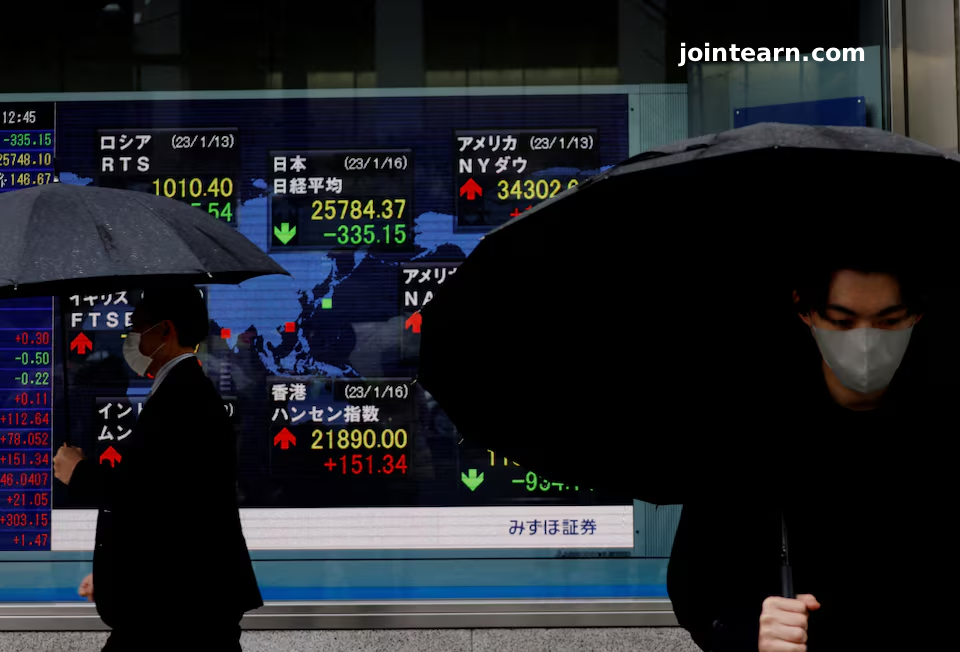
BOJ Flags Signs of Stock Market Overheating Amid Record Nikkei Rally
Tokyo, October 23, 2025 — The Bank of Japan (BOJ) issued a stark warning on Thursday, noting that Japan’s surging stock market is showing early signs of overheating. The central bank’s latest Financial System Report cautioned that rising speculation, fueled by foreign hedge funds and ultra-loose monetary conditions, could lead to sharp market corrections if global uncertainty intensifies.
The alert comes just days after Japan’s Nikkei 225 index reached an all-time high, boosted by optimism surrounding Prime Minister Sanae Takaichi’s victory in parliament and her pledge for aggressive fiscal stimulus. The benchmark has jumped nearly 24% year-to-date, marking one of the strongest performances among major global equity indices.
However, the BOJ warned that a combination of leverage-driven trading, rising property prices, and uncertainty over U.S. trade policy could create financial vulnerabilities.
“In the event of unexpected changes in the market environment, hedge funds’ rapid position adjustments accompanied by deleveraging can amplify volatility in asset prices,” the BOJ said. “If such adjustments occur in government bond markets, this could affect a wide range of financial instruments in Japan.”
Hedge Funds Increasingly Influence Japan’s Bond Market
The central bank’s report highlighted that foreign hedge funds have been ramping up leveraged positions in Japanese government bonds (JGBs), particularly in long-dated maturities. This trend, the BOJ noted, raises the risk of sudden sell-offs that could send yields higher and spill over into broader financial markets.
Earlier this year, super-long JGB yields spiked in April and May after hedge funds unloaded bonds amid political discussions about a massive fiscal stimulus package that would increase government debt issuance.
While yields have since stabilized, analysts warn that Prime Minister Takaichi’s spending plans could spark another bond-market correction and weaken the yen if fiscal expansion accelerates.
Heat Map Signals “Red” for Stock Prices
To assess potential imbalances, the BOJ used a heat map that measures risk levels across different asset classes. The indicator flashed “red” for stock prices, signaling overheating conditions, while all 13 other financial categories remained in the “green” zone — suggesting no immediate deviation from trend levels.
“Given that Japanese banks hold a certain amount of market risk through their stockholdings, close attention should be paid to developments in risky asset prices,” the central bank warned.
The BOJ’s caution reflects growing concerns that the Nikkei’s record run could outpace underlying economic fundamentals, especially as global trade tensions threaten corporate profits.
Property Prices Climb in Tokyo and Other Major Cities
Alongside equities, real estate prices have surged, particularly in metropolitan areas such as Tokyo, Osaka, and Yokohama. The BOJ attributed the rise partly to foreign investment inflows seeking refuge from weaker currencies and negative real yields elsewhere.
According to the Real Estate Economic Institute, new condominium prices in the Tokyo metropolitan region jumped 20.4% between April and September compared to a year earlier.
“If market participants’ view on future real estate demand changes, a correction in real estate prices could occur,” the report stated. “Given that banks’ real estate-related exposures have been increasing, developments in property markets warrant close attention.”
BOJ Maintains Financial Stability but Urges Caution
Despite the warning signals, the BOJ reassured that Japan’s financial system remains stable, with banks maintaining robust capital buffers and ample liquidity to withstand market shocks.
The central bank emphasized that while monetary policy primarily targets economic and price stability, it also integrates findings from financial imbalance monitoring to prevent systemic risks.
Critics, however, argue that years of ultra-low interest rates and a weak yen have inflated asset prices, encouraging speculative investment by both domestic and foreign players.
BOJ’s Policy Outlook: Slow and Cautious
The Bank of Japan ended its decade-long ultra-loose monetary policy last year, raising short-term interest rates to 0.5% in January 2025 after achieving steady progress toward its 2% inflation target.
Governor Kazuo Ueda has reiterated that the central bank will proceed cautiously with further hikes amid lingering uncertainty surrounding U.S. tariffs and their impact on Japan’s export-driven economy.
Most economists polled by Reuters expect the BOJ to deliver another modest rate hike in Q4 2025, possibly as soon as next week, if market stability persists.
“While the BOJ acknowledges signs of market overheating, policymakers remain focused on ensuring that tightening does not derail Japan’s fragile recovery,” said Satoshi Sugiyama, senior economist at Tokyo Financial Research.
Summary of Key Insights
- Nikkei 225 hits record high, up nearly 24% YTD.
- BOJ warns of overheating in stocks and rising property prices.
- Foreign hedge funds increase leverage in Japanese bond markets.
- Tokyo real estate prices up 20.4% year-over-year.
- BOJ maintains stability but signals caution on further rate hikes.
- Potential U.S. trade uncertainty could spark asset volatility.


Leave a Reply